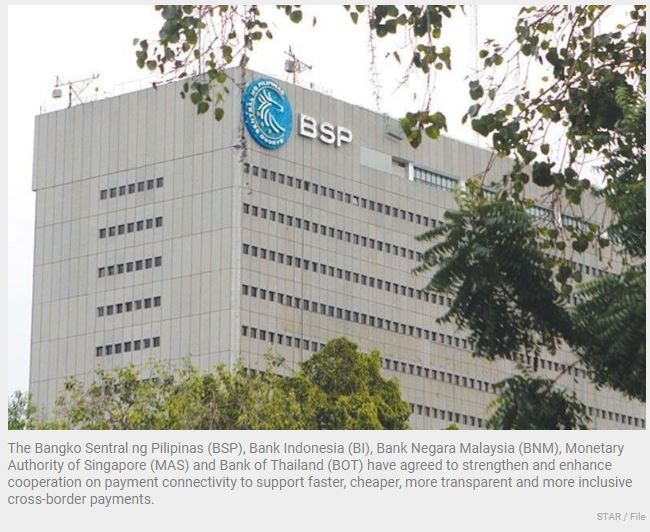Philippines: BSP pushes ASEAN cross-border payment
MANILA, Philippines — The Philippine central bank has joined the push for a regional payment connectivity among member economies of the Association of Southeast Asian Nations (ASEAN).
The Bangko Sentral ng Pilipinas (BSP), Bank Indonesia (BI), Bank Negara Malaysia (BNM), Monetary Authority of Singapore (MAS) and Bank of Thailand (BOT) have agreed to strengthen and enhance cooperation on payment connectivity to support faster, cheaper, more transparent and more inclusive cross-border payments.
On the sidelines of the G20 Leaders’ Summit held in Bali, Indonesia, ASEAN central banks signed a memorandum of understanding (MOU) on Cooperation in Regional Payment Connectivity (RPC).
BSP Deputy Governor Mamerto Tangonan, who represented BSP Governor Felipe Medalla, said the agreement enhances cross-border payments in the region.
“The more we recognize how interdependent our economies are, the more we need to be deliberate in our pursuit of the vision of an interconnected ASEAN region. This MOU concretizes our collaborative and inclusive approach to enhancing cross-border payments in the ASEAN that will translate into efficiency gains and cost savings in various international financial transactions and economic activities,” Tangonan said.
In his keynote address, Indonesia’s President Joko Widodo emphasized the importance of concrete joint collaborative action in addressing global challenges.
He also expressed his highest appreciation to the governors of the five central banks for their commitment to delivering innovative breakthroughs that would further accelerate regional payment connectivity.
The RPC is expected to be a significant contributor to accelerating regional economic recovery and promoting inclusive growth.
The implementation of cross-border payment connectivity serves to support and facilitate cross-border trade, investment, financial deepening, remittance, tourism and other economic activities, as well as a more inclusive financial ecosystem in the region.
This is particularly beneficial for micro, small and medium enterprises as it will facilitate their participation in international markets. The cooperation will include a number of modalities, including QR code and fast payment.
Accelerating economic and financial digitalization has become a global initiative, with the G20 establishing its Roadmap for Enhancing Cross-Border Payments.
The cooperation initiative is also in line with Indonesia’s G20 Presidency priority agenda in the area of digital transformation, including through payment systems in the digital era, manifested by the joint efforts to pursue enhanced cross-border payment connectivity involving Indonesia, Malaysia, the Philippines, Singapore and Thailand.
Going forward, the payment connectivity initiative can be expanded to include other countries in the region and potentially other partner countries outside the region
This milestone also marks the start of Indonesia’s chairmanship of the ASEAN in 2023.
The joint collaboration also supports ASEAN’s shared aspiration for connected payment systems that will enable fast, seamless and more affordable cross-border payments across the region.
In line with ASEAN’s pragmatic approach to deepen integration through mutually beneficial arrangements based on the level of readiness, this initiative provides the building blocks for wider ASEAN participation in the near future, thereby fostering stronger regional economic ties.
“This MOU serves as a significant milestone in paving the road for advancing cross-border payment connectivity. Existing bilateral payment connectivity arrangements will be expanded as part of the region’s efforts to strengthen its economic integration. Such collaboration among central banks is key to accelerating economic recovery. We hope that other countries will follow this good example and leadership in implementing cross-border payment connectivity,’’ BI Governor Perry Warjiyo said.
BNM Governor Nor Shamsiah Yunus said the initiative underscores the importance of central bank collaboration in supporting the development of next-generation payment connectivity.
MAS managing director Ravi Menon explained the MOU underscores ASEAN’s commitment to achieve regional payments interoperability and connectivity by 2025 to enable cheaper, faster, and more transparent cross-border payments.
BOT Deputy Governor Ronadol Numnonda said the ASEAN region has now become a global hotspot in cross-border payments linkages.
Source: https://www.philstar.com/business/2022/11/15/2223789/bsp-pushes-asean-cross-border-payment


 Thailand
Thailand




